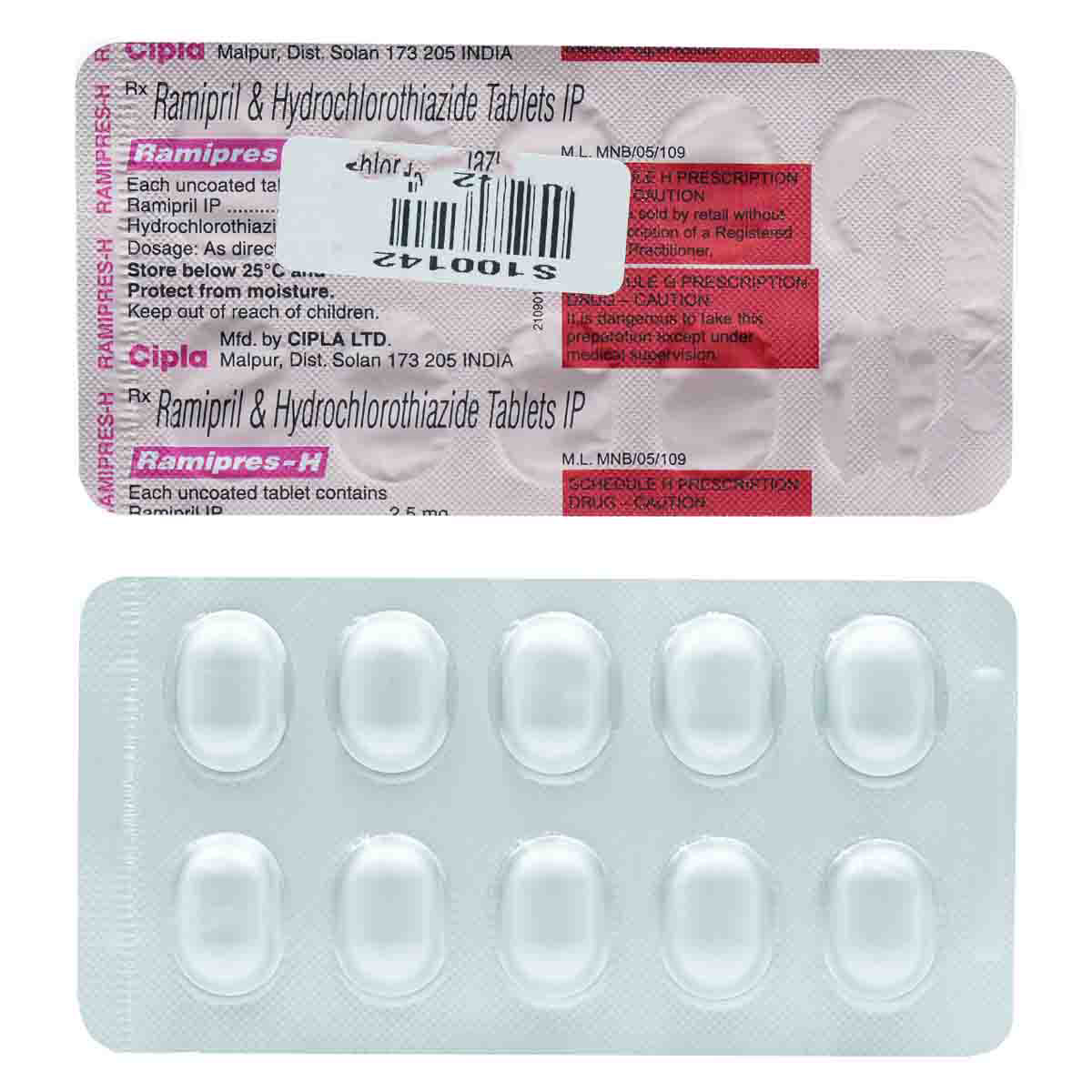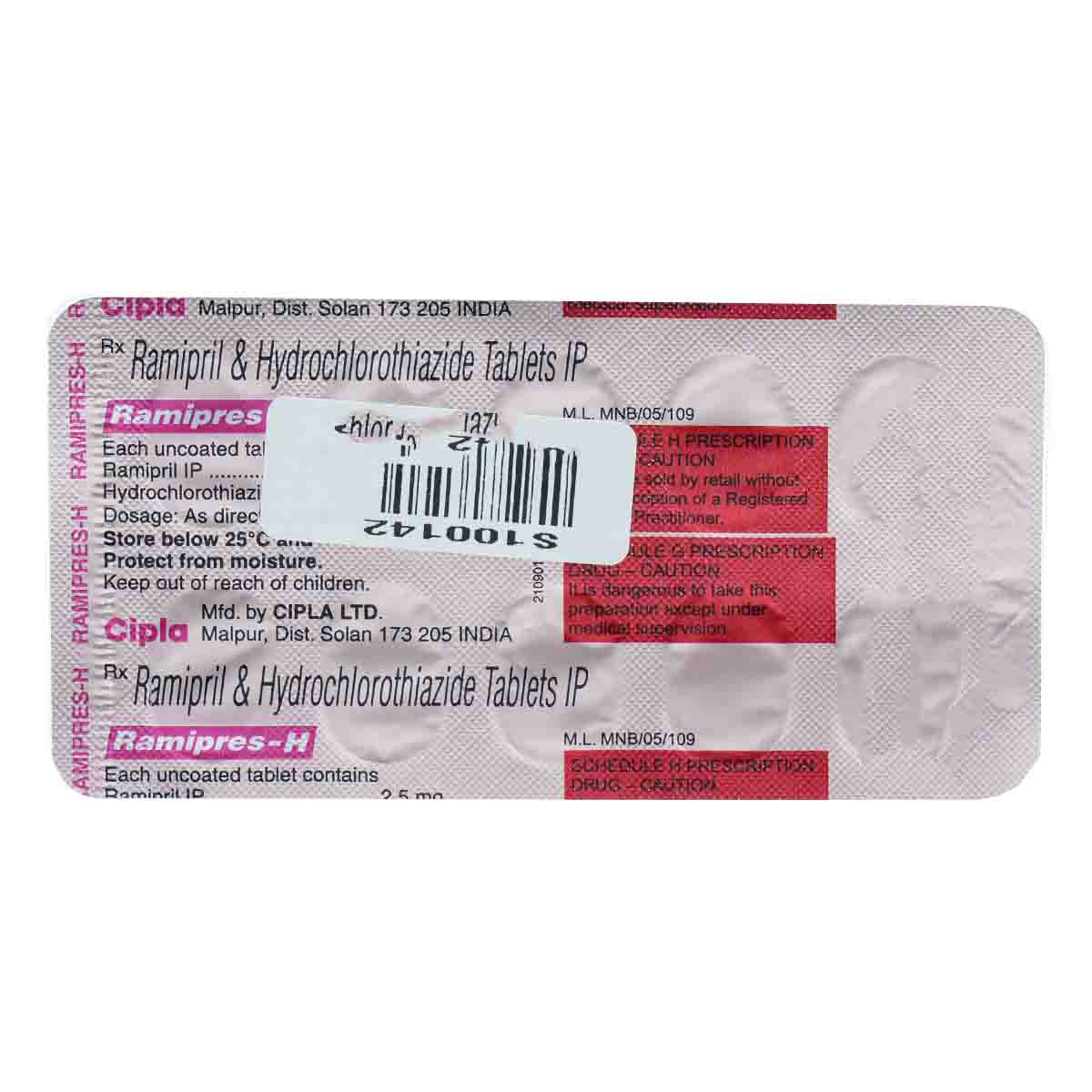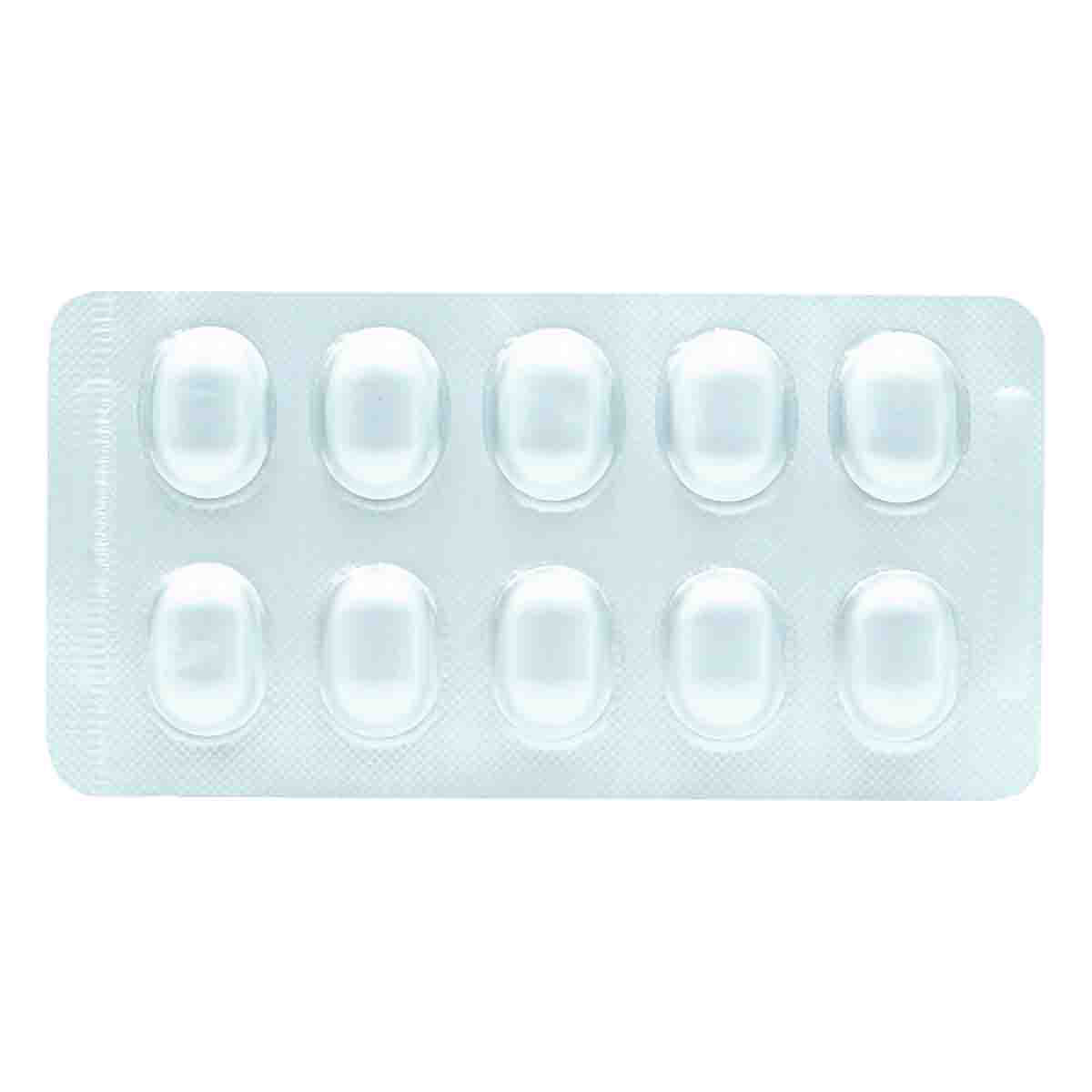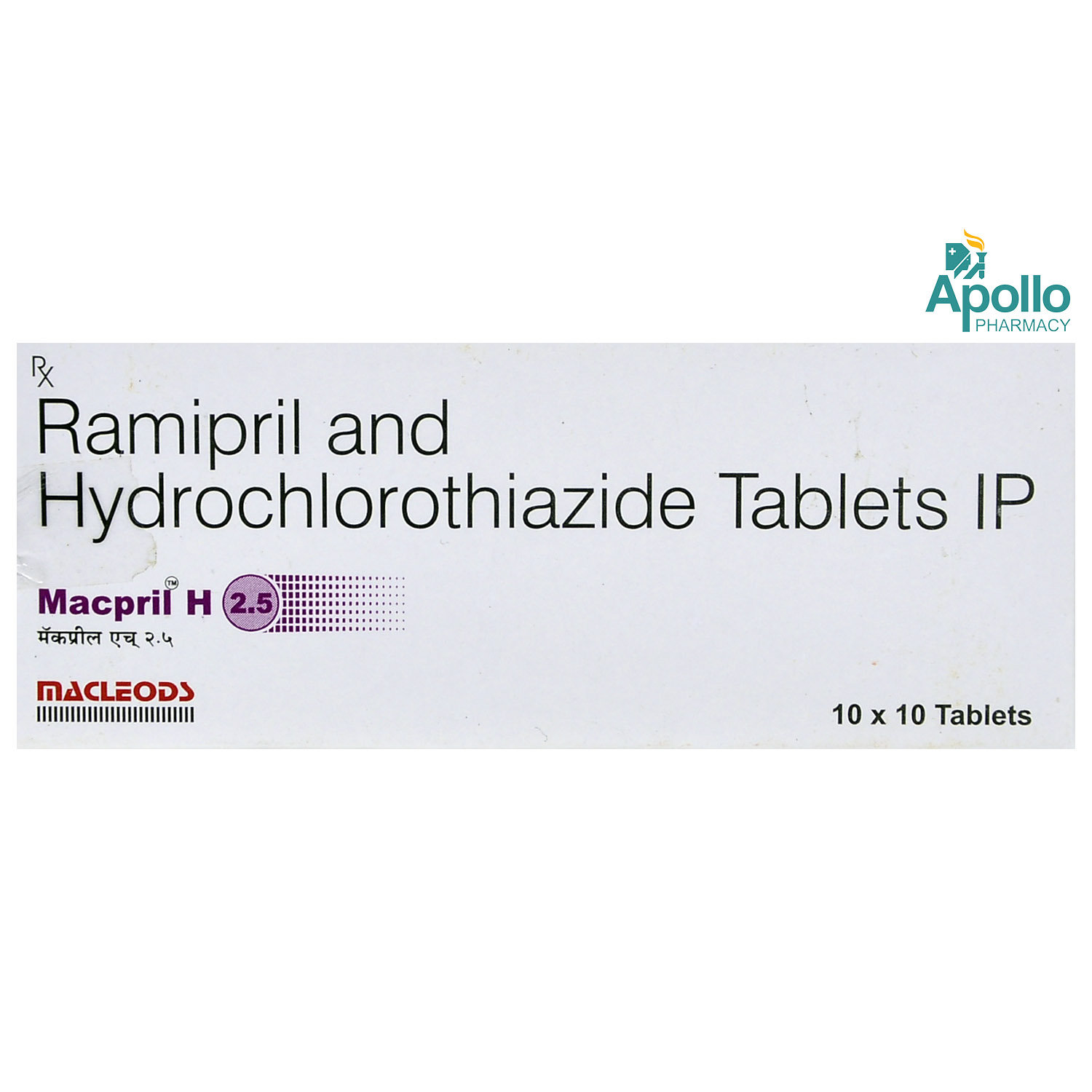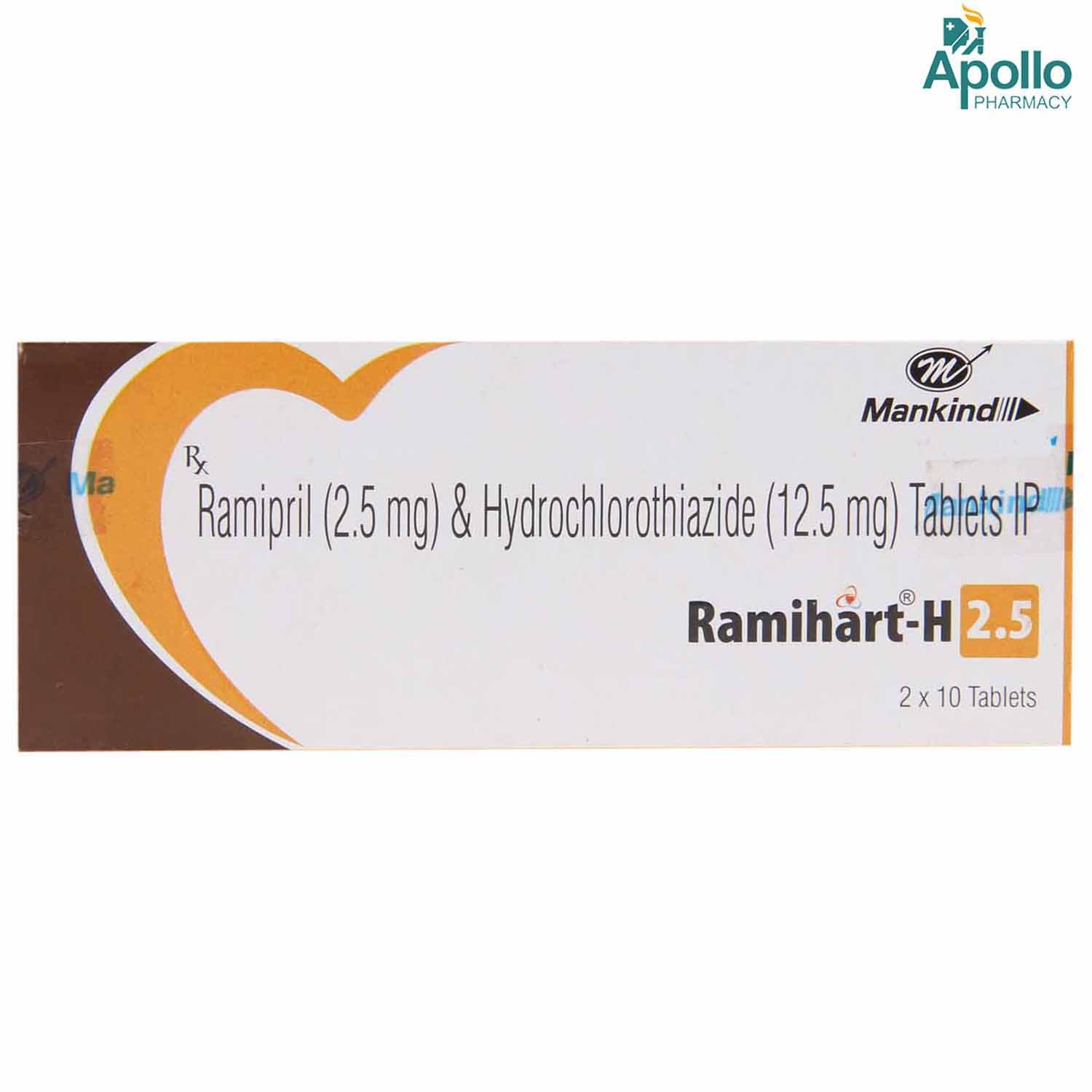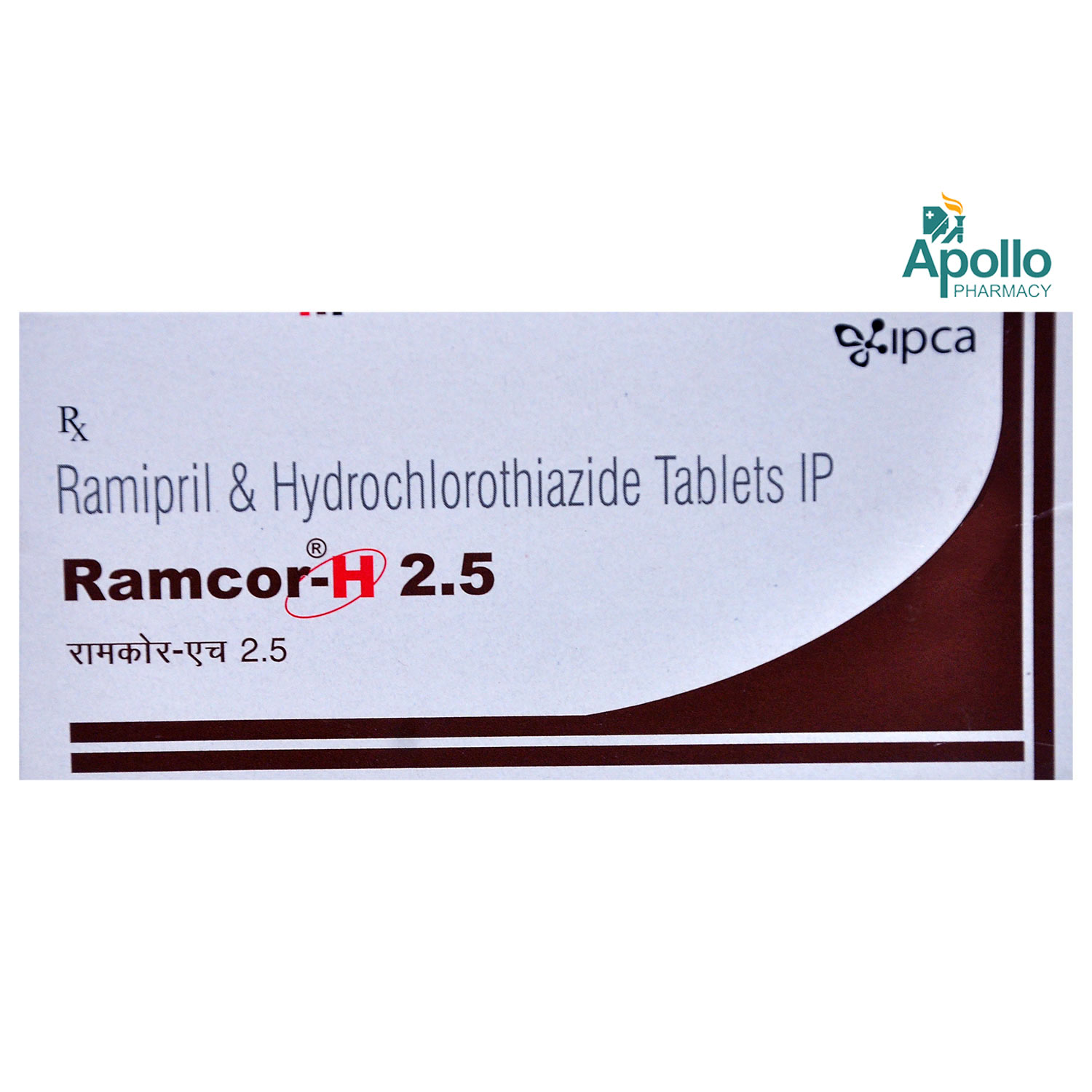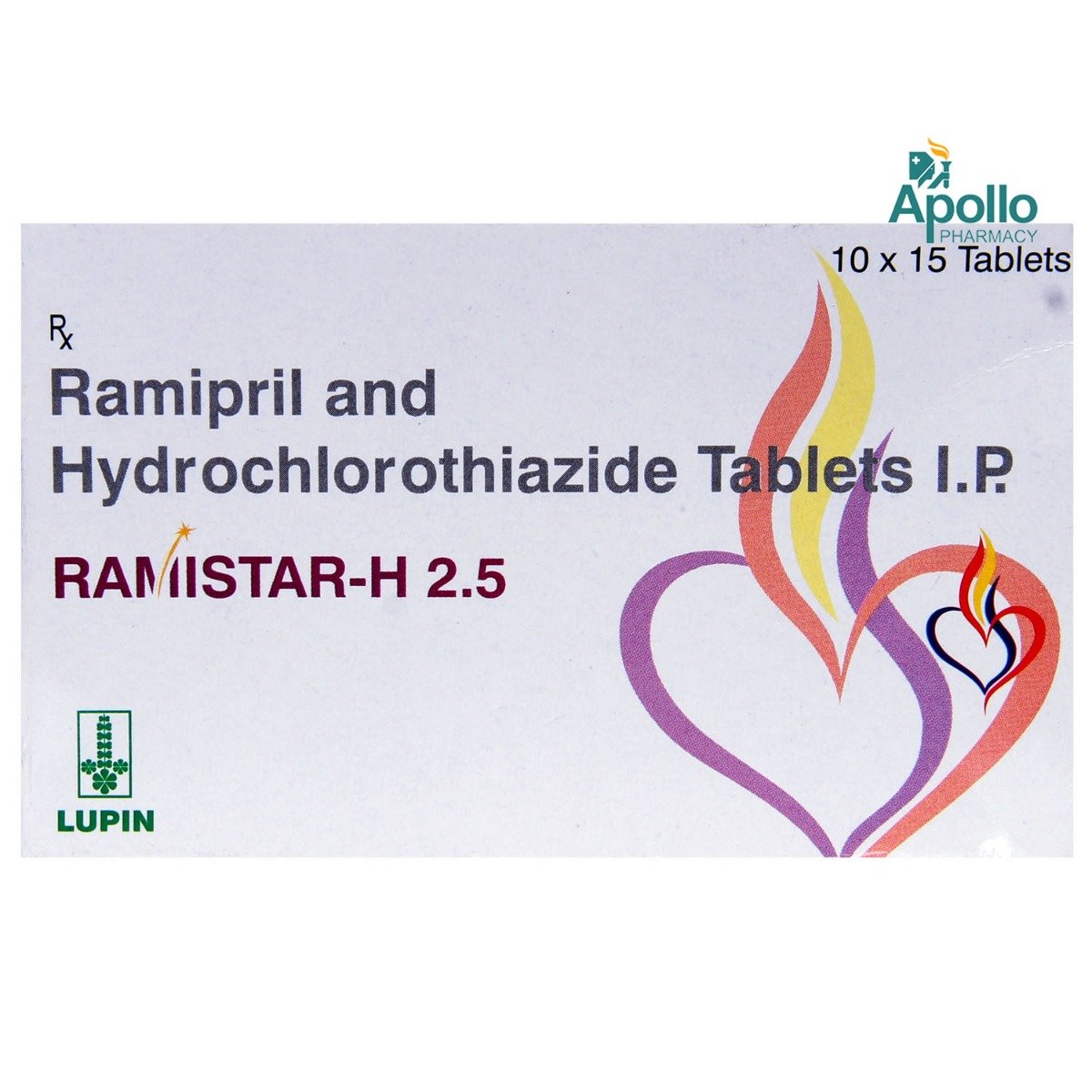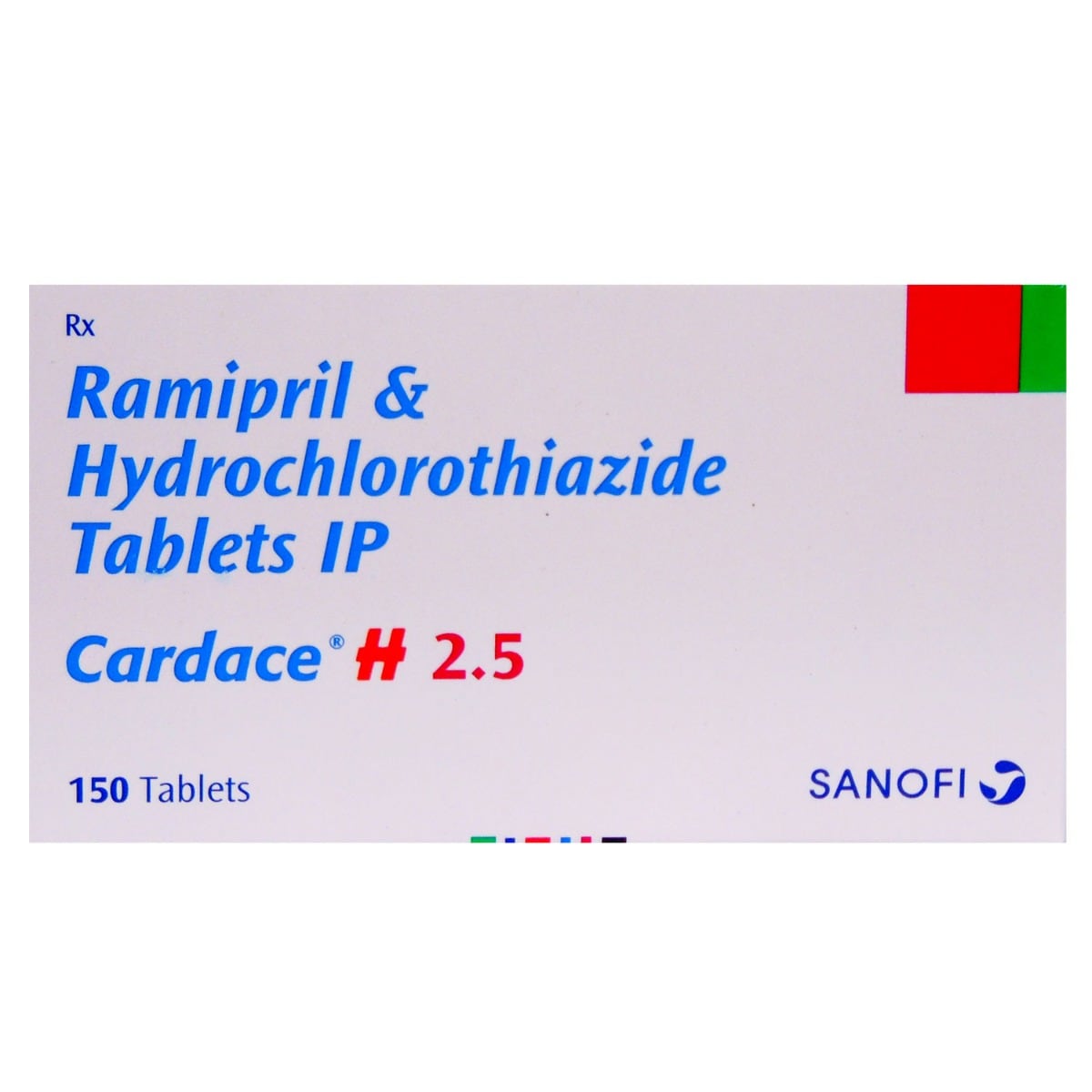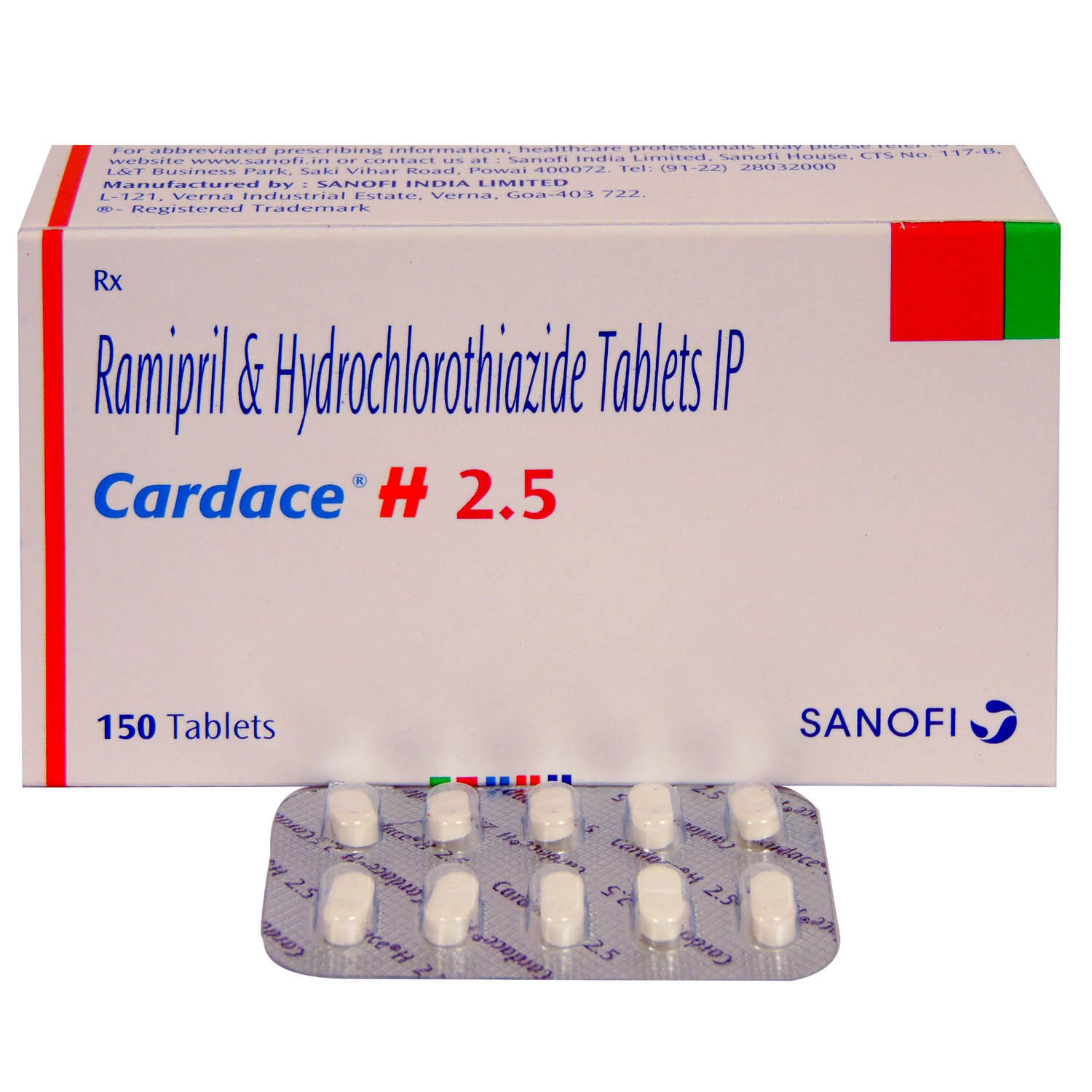Ramipres-H Tablet 10's
MRP ₹133.5
(Inclusive of all Taxes)
₹20.0 Cashback (15%)
Provide Delivery Location
Online payment accepted
 Prescription drug
Prescription drugWhats That
Composition :
Manufacturer/Marketer :
Consume Type :
Expires on or after :
Return Policy :
About Ramipres-H Tablet
Ramipres-H Tablet belongs to a class of medication called 'anti-hypertensive agents' prescribed alone or in combination with other drugs to lower the raised blood pressure. Hypertension (High blood pressure) is a condition in which the force exerted by the blood against the artery walls becomes so high that it causes health problems, such as heart disease.
Ramipres-H Tablet contains two medicines: Ramipril (blood pressure-lowering agent) and Hydrochlorothiazide (diuretics or water pills). Ramipril is an angiotensin-converting enzyme or ACE inhibitor that lower increased blood pressure by blocking a naturally occurring substance known as angiotensin II (that tightens your blood vessels). It allows these constricted blood vessels to relax and therefore helps lower high blood pressure. On the other hand, Hydrochlorothiazide (diuretic) works by increasing the amount of urine passed out from the kidneys. It effectively reduces excess fluid overload in the body and treats oedema (swelling) associated with heart, liver, kidney, or lung disease. This reduces the heart's workload and makes the heart more efficient at pumping blood throughout the body. Thus, both help lower high blood pressure, reducing heart attack or stroke chances.
You can take Ramipres-H Tablet with a meal or after/before a meal. Your doctor will advise you on the exact dosage and how often you have to take Ramipres-H Tablet based on your medical condition. Sometimes, you may experience headaches, tiredness, slow heart rate, and nausea. Most of these side effects of Ramipres-H Tablet do not require medical attention and gradually resolve over time. However, if the side effects are persistent, reach out to your doctor. Ramipres-H Tablet may lower your blood pressure, especially if taken with alcohol. So, avoid driving and operating heavy machinery.
Try not to stop taking this medicine of your own. You should not stop using the Ramipres-H Tablet even if your blood pressure becomes normal. Doing so may worsen your condition. Tell your doctor if you have had or currently have liver, kidney, or heart problems. Ramipres-H Tablet is not recommended in pregnancy and lactation. You should regularly monitor your blood pressure and heart rate. Please tell your doctor if you are taking any other medicines or are allergic to Ramipres-H Tablet . Reducing the amount of table salt (sodium chloride) in your food often relieves the body's swelling.
Uses of Ramipres-H Tablet
Directions for Use
Key Benefits
Ramipres-H Tablet contains Ramipril and hydrochlorothiazide. Ramipril is an angiotensin-converting enzyme (ACE) inhibitor that lowers increased blood pressure by blocking a naturally occurring substance known as angiotensin II (that tightens your blood vessels). It allows these constricted blood vessels to relax and therefore helps lower high blood pressure. On the other hand, Hydrochlorothiazide (diuretic) works by increasing the amount of urine passed out from the kidneys. It effectively reduces excess fluid levels in the body and treats oedema (swelling) associated with heart, liver, kidney, or lung disease. This reduces the heart's workload and makes the heart more efficient at pumping blood throughout the body. Thus, both help lower high blood pressure, reducing the chances of heart attack or stroke. However, Ramipres-H Tablet does not cure high blood pressure (hypertension) but does help control it. In addition to this, Ramipres-H Tablet also reduces the physical effects of anxiety.
Storage
- If you experience low blood pressure symptoms like dizziness, lightheadedness, or fainting while taking medication, seek immediate medical attention.
- Make lifestyle modifications and adjust your medication regimen under medical guidance to manage low blood pressure.
- As your doctor advises, regularly check your blood pressure at home. Record your readings to detect any changes and share them with your doctor.
- Fluid intake plays a vital role in managing blood pressure by maintaining blood volume, regulating blood pressure, and supporting blood vessel function. Drinking enough fluids helps prevent dehydration, maintain electrolyte balance, and regulate fluid balance.
- Take regular breaks to sit or lie down if you need to stand for long periods.
- When lying down, elevate your head with extra pillows to help improve blood flow.
- Avoid heavy exercise or strenuous activities that can worsen low blood pressure.
- Wear compression socks as your doctor advises to enhance blood flow, reduce oedema, and control blood pressure.
- If symptoms persist or worsen, or if you have concerns about your condition, seek medical attention for personalized guidance and care.
- Tell your doctor about the cough symptoms you're experiencing, which may be triggered by your medication.
- Your doctor may adjust your treatment plan by changing your medication, adding new medications, or providing guidance on managing your cough symptoms.
- Practice good hygiene, including frequent handwashing, avoiding close contact with others, and avoiding sharing utensils or personal items.
- Stay hydrated by drinking plenty of fluids, such as water, tea, or soup, to help thin out mucus and soothe your throat.
- Get plenty of rest and engage in stress-reducing activities to help your body recover. If your cough persists or worsens, consult your doctor for further guidance.
- Confusion is a major psychotic disorder that needs immediate medical attention.
- Acknowledge your experience and put effort to control confusion.
- Avoid smoking and alcohol intake as it can worsen the condition and increase your confusion.
- Practice meditation and yoga to avoid anxiety, which can be one of the leading causes.
- Talk to your dietician and consume food that can improve your mental health.
- Always wear loose-fitting clothes which are suitable for your activity.
- Include the diet containing fruits like watermelon, grapes, bananas and green leafy vegetables.
- Drink plenty of water stay hydrated.
- Avoid moving more and staying in hot sun.
- Hydrate your body: Drink enough water to prevent dehydration and headaches.
- Calm Your Mind: Deep breathing and meditation can help you relax and relieve stress.
- Rest and Recharge: Sleep for 7-8 hours to reduce headache triggers.
- Take rest: lie down in a quiet, dark environment.
- Cold or warm compresses can help reduce tension.
- Stay Upright: Maintain good posture to keep symptoms from getting worse.
- To treat headaches naturally, try acupuncture or massage therapy.
- Over-the-counter pain relievers include acetaminophen and ibuprofen.
- Prescription Assistance: Speak with your doctor about more substantial drug alternatives.
- Severe Headaches: Seek emergency medical assistance for sudden, severe headaches.
- Frequent Headaches: If you get reoccurring headaches, consult your doctor.
- Headaches with Symptoms: Seek medical attention if your headaches include fever, disorientation, or weakness.
- Inform your doctor about dizziness symptoms. They may adjust your medication regimen or prescribe additional medications to manage symptoms.
- Follow your doctor's instructions for taking medication, and take it at the same time every day to minimize dizziness.
- When standing up, do so slowly and carefully to avoid sudden dizziness.
- Avoid making sudden movements, such as turning or bending quickly, which can exacerbate dizziness.
- Drink plenty of water throughout the day to stay hydrated and help alleviate dizziness symptoms.
- If you're feeling dizzy, sit or lie down and rest until the dizziness passes.
- Track when dizziness occurs and any factors that may trigger it, and share this information with your doctor to help manage symptoms.
Drug Warnings
Ramipres-H Tablet should not be given to the people allergic to Ramipres-H Tablet , have low blood pressure (less than 90 mm of Hg), have had a heart attack, diabetes, kidney disease, liver disease, are pregnant women, or planning to get pregnant and breastfeeding women. Ramipres-H Tablet may alter your blood sugar level, so tell your doctor about this before using Ramipres-H Tablet . Besides this, it is contraindicated in low blood pressure (hypotension), cardiogenic shock (sudden stopping of blood flow to the heart), anuria (patients with nil urine output), and aortic stenosis (heart valve problem). Ramipres-H Tablet can pass into breast milk, but its effect on the baby is unknown. So, it is better to tell your doctor if you take Ramipres-H Tablet and breastfeeding. Do not consume alcohol with Ramipres-H Tablet as it may increase the risk of low blood pressure. Avoid potassium supplements with Ramipres-H Tablet as they may lead to high potassium levels in the blood. Regular blood tests and blood pressure monitoring are recommended while taking Ramipres-H Tablet . Drink a lot of fluids as Ramipres-H Tablet can cause dehydration, so to avoid unpleasant side effects, increase the intake of fluids.
Drug-Drug Interactions
Drug-Drug Interactions
Login/Sign Up
Taking aliskiren together with Ramipres-H Tablet may increase the risk of serious side effects such as kidney problems, low blood pressure, and high potassium levels in the blood. High levels of potassium can develop into a condition known as hyperkalemia, which in severe cases can lead to kidney problems, muscle paralysis and irregular heart rhythm.
How to manage the interaction:
Taking Ramipres-H Tablet with Aliskiren is not recommended, but can be taken if prescribed by a doctor. However, consult your doctor if you feel nausea, vomiting, weakness, confusion, tingling in the hands and feet, a sensation of heaviness in the legs, a weak pulse, or a slow or irregular heartbeat. You must drink enough fluids while taking these medications. It is advised to reduce the intake of foods high in potassium, including tomatoes, raisins, figs, potatoes, lima beans, bananas, plantains, papayas, pears, cantaloupes, mangoes. Do not discontinue any medications without a doctor's advice.
Taking Ramipres-H Tablet with potassium acetate may significantly increase potassium levels in the blood. High levels of potassium can develop into a condition known as hyperkalemia, which in severe cases can lead to kidney problems, muscle paralysis and irregular heart rhythm
How to manage the interaction:
Although there is a interaction between Ramipres-H Tablet and Potassium acetate, but it can be taken if prescribed by a doctor. However, if you notice any nausea, vomiting, weakness, confusion, tingling of the hands and feet, feelings of heaviness in the legs, or irregular heartbeat, you should contact a doctor immediately. Avoid taking a potassium-rich diet (tomatoes, raisins, figs, potatoes, lima beans, bananas, plantains, papayas, pears, cantaloupes, mangoes) while taking these medications. Do not stop using any medications without talking to a doctor.
Taking Ramipres-H Tablet together with Irbesartan may increase the risk of side effects such as low blood pressure, kidney function impairment, and a condition called hyperkalemia (high blood potassium).
How to manage the interaction:
Although taking Irbesartan with Ramipres-H Tablet together can possibly result in an interaction, it can be taken if a doctor has prescribed it. However, consult a doctor if you experience nausea, vomiting, weakness, disorientation, tingling in your hands and feet, feelings of heaviness in your legs, or a slow or irregular heartbeat. Do not discontinue any medications without a doctor's advice.
Using Ramipres-H Tablet together with spironolactone may cause hyperkalemia (increase the levels of potassium in your blood).
How to manage the interaction:
Although taking spironolactone and captopril together can possibly result in an interaction, it can be taken if your doctor has prescribed it. However, consult the doctor immediately if you experience symptoms such as weakness, confusion, numbness or tingling, and uneven heartbeat. Do not stop using any medications without consulting doctor.
Taking Azilsartan medoxomil with Ramipres-H Tablet may cause low blood pressure, kidney function impairment, and increased potassium levels in the blood.
How to manage the interaction:
Although taking Ramipres-H Tablet together with Azilsartan medoxomil can result in an interaction, they can be taken together if prescribed by a doctor. However, consult a doctor if you experience vomiting, weakness, confusion, tingling in the hands and feet, or palpitations. Do not discontinue any medications without a doctor's advice.
Taking Ramipres-H Tablet with Valsartan may increase the risk of side effects (low blood pressure, kidney function impairment, and hyperkalemia (high blood potassium).
How to manage the interaction:
Although taking Ramipres-H Tablet together with Valsartan can result in an interaction, they can be taken together if prescribed by a doctor. However, consult a doctor if you feel nausea, vomiting, weakness, confusion, tingling in the hands and feet, a sensation of heaviness in the legs, a weak pulse, or a slow or irregular heartbeat. You must drink enough fluids while taking these medications. Do not stop taking any medication without consulting a doctor.
Taking Potassium Iodide with Ramipres-H Tablet may significantly increase potassium levels in the blood. High levels of potassium can develop into a condition known as hyperkalemia, which in severe cases can lead to kidney problems, muscle paralysis and irregular heart rhythm.
How to manage the interaction:
Although there is a interaction between Potassium iodide and Ramipres-H Tablet, you can take these medicines together if prescribed by a doctor. However, if you notice any nausea, vomiting, weakness, confusion, tingling of the hands and feet, feelings of heaviness in the legs, or irregular heartbeat, you should contact a doctor immediately. Avoid taking a potassium-rich diet (tomatoes, raisins, figs, potatoes, lima beans, bananas, plantains, papayas, pears, cantaloupes, mangoes) while taking these medications. Do not stop using any medications without talking to a doctor.
Coadministration of Ramipres-H Tablet together with eprosartan may increase the risk of side effects such as low blood pressure, kidney function impairment, and a condition called hyperkalemia (high blood potassium).
How to manage the interaction:
Although taking Ramipres-H Tablet together with Eprosartan can possibly result in an interaction, they can be taken together if prescribed by your doctor. However, consult your doctor if you feel nausea, vomiting, weakness, confusion, tingling in the hands and feet, a sensation of heaviness in the legs, a weak pulse, or a slow or irregular heartbeat. You must drink enough fluids while taking these medications. Do not stop taking any medication without consulting your doctor.
Taking Ramipres-H Tablet and amiloride together may increase the levels of potassium in your blood.
How to manage the interaction:
Although taking amiloride along with Ramipres-H Tablet can result in an interaction, they can be taken together if prescribed by a doctor. However, consult the doctor if you feel weakness, confusion, numbness or tingling, and uneven heartbeats. Do not stop taking any medication without consulting a doctor.
Taking leflunomide with Ramipres-H Tablet can increase the risk of liver problems.
How to manage the interaction:
Although taking Ramipres-H Tablet with Leflunomide can result in an interaction, they can be taken together if prescribed by a doctor. However, if you experience fever, chills, joint pain or swelling, unusual bleeding or bruising, skin rash, itching, less desire to eat, fatigue, nausea, vomiting, abdominal pain, or yellowing of the skin or eyes, contact a doctor immediately. Do not discontinue any medications without consulting a doctor.
Drug-Food Interactions
Drug-Food Interactions
Login/Sign Up
Lentils, Orange Juice, Oranges, Raisins, Potatoes, Salmon Dried, Spinach, Sweet Potatoes, Tomatoes, Coconut Water, Beans, Beetroot, Broccoli, Bananas, Apricots, Avocado, Yogurt
How to manage the interaction:
Consuming potassium-rich foods while using Ramipres-H Tablet may increase the potassium levels in your blood. It is recommended to avoid potassium-rich foods while using Ramipres-H Tablet. If you experience a fast heartbeat, shortness of breath, chest pain, nausea, or vomiting, consult your doctor immediately.
Diet & Lifestyle Advise
- Keep your weight under control with a body mass index (BMI) of 19.5-24.9.
- Do regular physical activity or exercise for at least 150 minutes per week, or about 30 minutes most days of the week. Doing this can help lower your raised blood pressure by about 5 mm Hg.
- Opt for a diet rich in whole grains, fruits, veggies, and low-fat dairy products.
- Limit sodium chloride (table salt) intake in your daily diet to 2300 mg per day or less than 1500 mg is ideal for most adults.
- If you are taking alcohol, then only one serving for women and two servings is advisable.
- Quitting smoking is the best strategy to lower the risk of heart disease.
- Avoid chronic stress as it can raise your blood pressure. Try to enjoy and spend time with your loved ones to cope with stress and practice mindfulness techniques.
- Monitor your blood pressure daily and if there is too much fluctuation, immediately contact your doctor.
- Including heart-healthy omega-3 fatty acid acid-containing foods in your daily diet.
- Use low-fat cooking oil like olive oil, soybean oil, canola oil, and coconut oil to lower your elevated blood pressure.
Side Effects of Ramipres-H Tablet
- Feeling dizzy or lightheaded
- Headache
- Diarrhoea
- Being sick
- Mild skin rash
- Blurred vision
- Hypotension
- Nausea (feeling sick)
Habit Forming
Therapeutic Class
All Substitutes & Brand Comparisons
RX
Out of StockRL HT 2.5 mg/12.5 mg Tablet
Sunij Pharma Pvt Ltd
₹38.86
(₹3.5 per unit)
70% CHEAPERRX
RL HT Tablet 10's
Sunij Pharma Pvt Ltd
₹44
(₹3.96 per unit)
67% CHEAPERRX
Out of StockPreface H 2.5 mg/12.5 mg Tablet
Centaur Pharmaceuticals Pvt Ltd
₹46.82
(₹4.21 per unit)
64% CHEAPER
Drug-Diseases Interactions
Drug-Diseases Interactions
Login/Sign Up
FAQs
Drug-Drug Interactions Checker List
- ATORVASTATIN
- METOPROLOL
- CARBAMAZEPINE
- PHENOBARBITAL
- LITHIUM
- METFORMIN
- DICLOFENAC
- ALLOPURINOL
- ASPIRIN
- TACROLIMUS
- DROSPIRENONE+ETHINYLESTRADIOL
- DIAZOXIDE
- PRAZOSIN
Special Advise
- Diagnostic tests like complete blood count (CBC), blood sodium and potassium levels, kidney function, and liver function should be closely monitored while taking treatment with Ramipres-H Tablet to check for side effects and treatment progress.
Disease/Condition Glossary
Blood pressure is the measurement of the force our heart uses to pump blood to all body parts. Hypertension is a chronic condition when blood pressure is too high. This condition can lead to hardened arteries (blood vessels), decreasing the blood and oxygen flow to the heart. High blood pressure (hypertension) can cause chest pain (angina) and heart attack (when blood supply to the heart is blocked), brain damage (stroke), and kidney failure. High blood pressure can be diagnosed with the help of a blood pressure monitor or sphygmomanometer. Systolic pressure is the pressure when the heart pumps blood out. On the other hand, diastolic pressure is when your heart is at the resting stage between heartbeats. If your blood pressure is 140/90 mm of Hg, it means the systolic pressure is 140 mm of Hg, and diastolic pressure is 90 mm of Hg. Ideal blood pressure should be between 90/60 mm of Hg and 120/80 mm of Hg.

Have a query?
Alcohol
Safe if prescribed
Ramipres-H Tablet may enhance the hypotensive (low blood pressure) effect if alcohol is taken along with. For better advice, you should consult your doctor about whether you can take Ramipres-H Tablet with alcohol.
Pregnancy
Consult your doctor
The use of Ramipres-H Tablet or any ACE inhibitors (Ramipril) is usually contraindicated during the second and third trimester of pregnancy. It may cause harm to the developing fetus. Hence, you should always consult your doctor before using Ramipres-H Tablet .
Breast Feeding
Consult your doctor
Use of Ramipres-H Tablet is not recommended during the breastfeeding stage.
Driving
Safe if prescribed
Drive with caution, Ramipres-H Tablet may cause blurry vision, and dizziness or weariness may occur.
Liver
Consult your doctor
Rare elevation in the liver enzymes (like bilirubin) has been observed while taking Ramipres-H Tablet , so it must be taken with caution. If you have a history of liver diseases/conditions, the dose may have to be adjusted by your doctor.
Kidney
Consult your doctor
Ramipres-H Tablet to be taken with caution, especially in case of severe kidney disease. The dose may have to be adjusted by your doctor. Ramipres-H Tablet should be given with precaution in hemodialysis condition.
Children
Safe if prescribed
Ramipres-H Tablet is not recommended for children. The safety and effectiveness of Ramipres-H Tablet have not been established in children due to limited testing of this drug on children by competent authorities worldwide. If necessary, your doctor will decide whether to give Ramipres-H Tablet or not.

